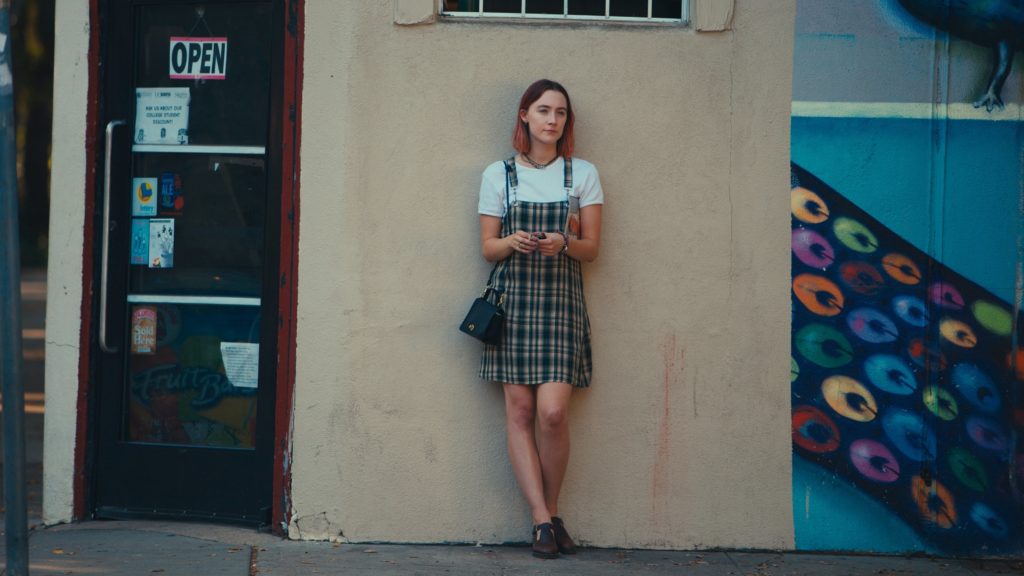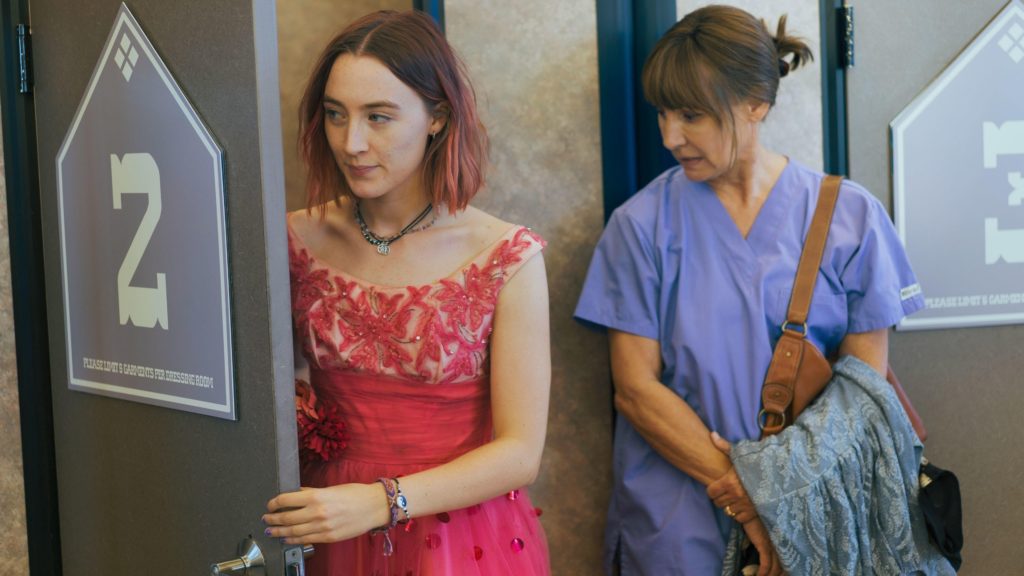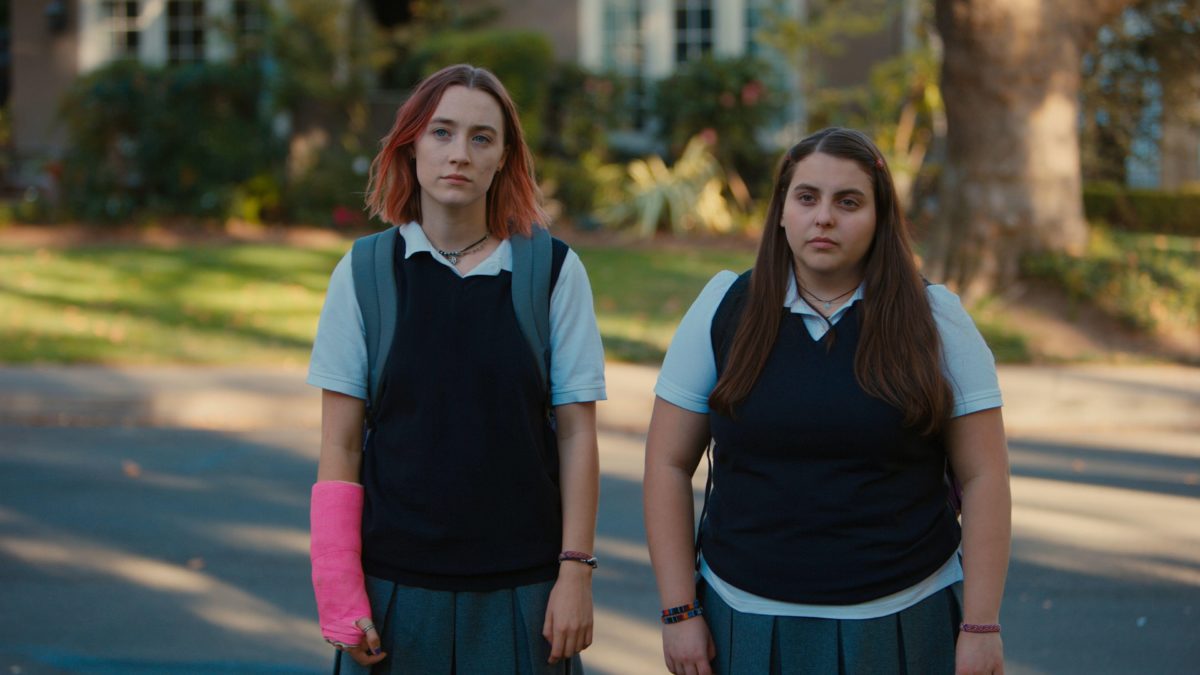Upon Lady Bird’s release in 2017, the teen cinema intelligentsia immediately declared it one of the all-time great teen comedies. And I can’t say I object too much. It’s genuinely great, not top 10 all time or even the #1 best of the genre from its decade, but I wouldn’t get too mad if you made the claim for each. If you view the “one of the GOATs” take as predictive of the movie’s enduring popularity, there’s definitely something there — even in just a few years, Lady Bird has become one of the most beloved movies in any genre of the 2010s.
The film’s most important strength is the terrific — dare I say iconic? — lead performance by Saoirse Ronan as the title character. Christine McPherson has given herself the nickname “Lady Bird” — presumably a reference to LBJ’s First Lady — as a rebellion mechanism. What she’s rebelling against is *gestures towards everything*: her mom, with whom she has a tumultuous relationship, her boring-ass (to her eyes) hometown of Sacramento circa 2002, and her uptight all-girls Catholic school. Generally, she has a listless lack of agency in anything in her life as she counts down to graduation. She’s a misfit that everyone will see at least some of themselves in.

Ronan really brings Lady Bird McPherson to life: Ronan can flicker through fifteen different emotions in a scene, translating the sometimes-shambling script by writer-director Greta Gerwig into a magnetic and multi-dimensional character. Ronan can be both vulnerable and brash when needed, and her comic delivery is quite good without calling attention to itself. But what really sets the performance apart are the little gestures of adolescent chipperness and angst — the way she, e.g., dramatically sits on the ground to open a letter she’s been anxiously awaiting. It’s easy for me to imagine her being one of my actual high school acquaintances.
At the core of Lady Bird is the relationship between the title character and her mother, Marion, in a brilliant performance by Laurie Metcalf. She nearly matches Ronan in carrying the film. Marion is a harried nurse with a huge but guarded heart, beloved in the community and her workplace but resented by Lady Bird for judgmental maternal chilliness. But there are more layers to it than that — Lady Bird sticks up for her mom, and seems mostly (but not entirely) aware of how hard her mom’s life is, and how much of that is poured into helping Lady Bird thrive, even if she rarely consciously acknowledges it.
Their relationship comes to a head in the film’s signature scene, an unexpected little gem of a tearjerker near the end of the film: When Marion is dropping Lady Bird off at the airport to go to college, the camera follows Marion rather than Lady Bird, and we see Marion panic that her stubbornness cost her a loving farewell to her daughter — symbolic of a lifelong loving relationship with her.

There’s much more to the film than the mother-daughter relationship, though. Gerwig’s script walks us through many of the end-of-high school totems, some of them depicted with freshness and pizzazz; others content to be a cliche, albeit a loving and cozy cliche. There’s the awkward loss of virginity, prom, graduation, applying to college, saying goodbye to friends, and realizing that maybe it’s okay not to grow up too fast. The Catholic school imagery and discussion gives it all an existential varnish: “God… why me?”
As effective as the execution and tone are — and they really are outstanding — it’s not an especially tightly-structured screenplay by Gerwig. She comes from the indie comedy scene — mumblecore included — so it’s not all that surprising that she meanders, but it still makes the movie feel like it’s 90% second act. I admit I even checked my watch once watching this time towards the middle of the film as we shuffled from one subplot to another.
It’s also a slightly insufferable piece of writing in a way that might not be to all tastes. The characters are frequently quite ornery and annoying. Gerwig’s humor is on the snarky side, and leans into the “flawed” part of “lovable-but-flawed.”

Much of the strong ensemble get one or two moments to stand out and add some flavor, even if a few of the arcs don’t really end up going anywhere interesting. (There’s a tossed-aside plot thread about a depressed drama teacher, for example, that’s just backdrop.) But it’s a really good cast. The competing but fatally-flawed boyfriends Timothee Chalamet and Lucas Hedges are excellent, as is Beanie Feldstein as the mousy best friend. Odeya Rush is a scene stealer as an aloof rich girl. I also quite like Tracy Letts as Lady Bird’s easygoing but struggling father; but if you’ve read me much, you know I have a soft spot for good movie dads, so that shouldn’t be a surprise.
As a director, Gerwig does good work in her solo debut (fun fact: you can’t just say “debut” because she co-directed a film called Nights and Weekends with Joe Swanberg back in 2008 that almost nobody saw). It is not nearly so dreary or snoozy as most indie comedy. There are even a few moments where the visuals manage to amplify what’s happening in the character work — I’m thinking again of the framing of Metcalf as she drives around the airport, trapped in her car. But her strength as a director is less about technique and more about creating vivid characters and emotional textures, and at that very subjective skill, I find her remarkably good. I’m not sure what to expect from Barbie, Gerwig’s next project — it seems like an odd fit, but I’m certainly curious.
It’s maybe not be the generation’s singular achievement of teen dramedy as its glowing reputation and popularity suggest, but I do think that Lady Bird is a really special film — one I won’t mind my own daughters rediscovering when they’re in high school.
Is It Good?
Exceptionally Good (7/8)
Dan is the founder and head critic of The Goods. Follow Dan on Letterboxd. Join the Discord for updates and discussion.

